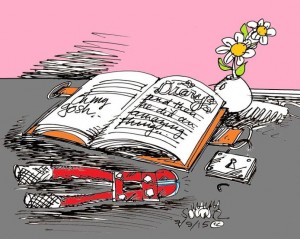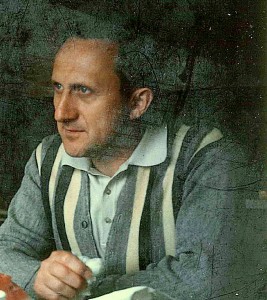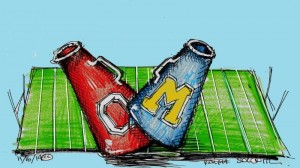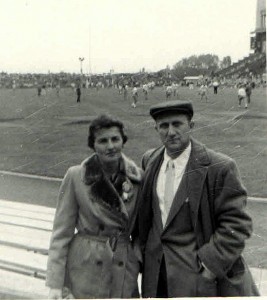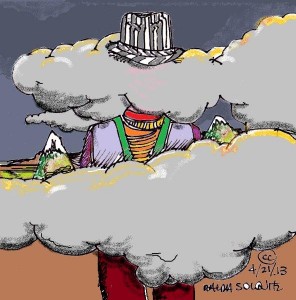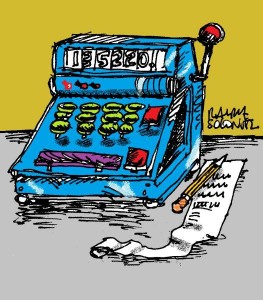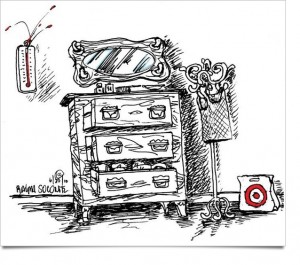Category — Toby
FLOOR AND MORE
FLOOR
I rented to a yoga lady. I went halves with her on a laminate floor for her storefront. She did the legwork, hired the installer, and sent me a bill. I expected a copy of the installer’s invoice, but I got the yoga woman’s note as to what I owed.
I did a Reagan trust-but-verify; I called the floor installers, whom I knew from way back. They had rented a store from me down the street. I hadn’t talked to them since they had moved out. The flooring woman said the numbers on the invoice were right, and she told me her husband had died of cancer at 54 in 2008. I said, “I can still picture you and Rick walking around the [flooring] store with sweaters on, freezing.” The store was on the end of the heating line and didn’t warm up too quickly.
The flooring woman mentioned my father, whom she remembered and had a good impression of. That always gets me –when people remember my dad. Not too many people do; he died in 1986. My dad had had a real affinity for young entrepreneurs: flower shop guys, flooring stores, beauty parlor owners, resale shops, bars, you name it.
—
I had an essay in the Cleveland Plain Dealer on Feb. 16. The story might have been paywalled. Here’s the whole thing:
SHY NO MORE
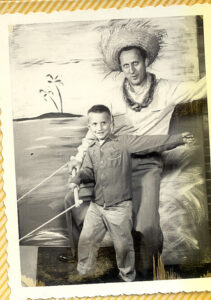
Bert and Toby Stratton, 1957, Victory Park School, South Euclid, Ohio
CLEVELAND HEIGHTS, Ohio — My family used to be shy. Then, in the 1950s, my father enrolled in a Dale Carnegie course on public speaking and became less shy. When I was in my 20s, my father bought me Carnegie’s book, “How to Win Friends and Influence People,” and I became less shy, too. When my children grew up, I bought them the book. Carnegie’s book, written in 1936, holds up. Carnegie’s message is, essentially, it’s not about you. He wrote “arouse in the other person an eager want.” Let the other person talk her head off, and you listen. Warren Buffet displayed his Carnegie-course diploma on his office wall.
Harvard psychologist Jerome Kagan wrote that shyness is partially inherited. There is a brain marker for shyness. However, if you are willing to work on shyness, you can become less shy.
I’m an extrovert now in my old age. When I play clarinet at nursing homes, the audience members occasionally heckle me, and I welcome that. I actually relish it. One listener blurted out, “Shut up and play!” And I kept on talking – bantering about whatever seemed amusing. I typically poll the audience about their lives and tell anecdotes between songs. I like all kinds of interactions, short of violence.
I ask the nursing-home residents what high schools they attended, and which delis they like. Corky & Lenny’s and Jack’s Deli finished in a dead-heat for first. Then Corky’s went under. Now the residents and I try to create lists of defunct Jewish delis: Budin’s, Seiger’s, Solomon’s, Irv’s, Lefton’s, Sand’s and Diamond’s. Are there others? As for where everybody went to high school, Cleveland Heights High comes in first. (It used to be Glenville High. I play mostly Jewish nursing homes.)
My dad, toward the end of his life, became fearless and often sent back tepid soup at restaurants, and he once told floor sanders to re-sand floors that came out too wavy. (My dad owned Lakewood apartment buildings with wood-plank floors.) The sanders were off-duty policemen, and my dad wouldn’t pay until those floors were smooth. I was impressed my dad would go head-to-head with cops. The height of my dad’s boldness was when he was in the Cleveland Clinic dying of leukemia. He told the doctor, “I own this place.” My father owned a $10,000 Cleveland Clinic municipal bond.
A hardware-store owner in Lakewood once said to me, “Nobody is going to jew me down on that price.” This was in the 1970s, and I was in my 20s and very shy. I spent several minutes pacing the store’s aisles before reapproaching the owner. I said, “Bob, you know, I’m Jewish.” Bob didn’t know that. He didn’t know “jew” was derogatory. He apologized. No big deal, in hindsight.
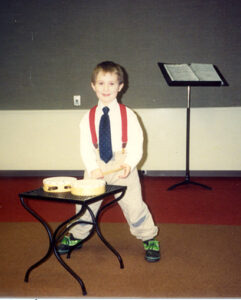
Jack Stratton on his first gig, age 3 1/2, Beachwood Library, 1991
When my youngest child, a musician, finished college, he moved to California to try to make it in the music business. I told him to call Joe McDonald of Country Joe and the Fish. I had gotten Joe’s number from a friend. Joe lived in California. My son said, “Who’s Country Joe?” Huh? Had my son never heard of Woodstock? Or at least seen the movie. I said, “Don’t be shy. Call him.” I was talking to myself mostly – my younger self.
My son didn’t call Country Joe. It takes time to become less shy.
Bert Stratton, a frequent contributor, lives in Cleveland Heights and has also written for The Wall Street Journal and New York Times. He writes the blog “Klezmer Guy: Real Music & Real Estate.”
February 21, 2024 1 Comment
MORE BOCA
In the winter, Cleveland Jews retreated to gated landsmanshaft (hometown association) condo developments in Florida to kvetch about the New Yorkers who had cut them off in the deli line earlier that day
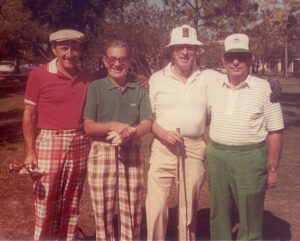
Toby Stratton, far left, 1983, Boca. (age 66)
Boca Lago (where my parents lived) was reunion central for alums from John Adams High and Glenville High in Cleveland. My parents wouldn’t play golf with anybody they hadn’t gone to grade school with. Exception: Detroit people were OK. (Detroiters had their own deli, the Detroiter, featuring Motown hot dogs and Vernor’s.) Other acceptable landslayt (countrymen) were Jews from Columbus, Cincinnati, Dayton and Pittsburgh. Those people were OK. They wouldn’t say, “I’m on line. Get behind me!” (Although they might say, “I’m in line. Get behind me!”)
My dad owned a Florida deli. (Actually, he was the deli’s landlord.) Toby owned a shopping strip center in Sunrise, Florida, that had a tenant Tam Tov Deli. The parking lot was always jammed. Cars of old Jews smashed regularly. Above the deli, there was office space, mostly vacant. My dad lost a lot on that building.
My dad liked deli food. I’ve written enough on that subject, but for the record, halvah was a big thing with Toby and doesn’t get enough play in this blog.
Glades Road, Boca Raton, had a Bagel Nosh, which was not up to standards. I told my dad,”We have that in Cleveland and it’s crap.” He agreed.
January 24, 2024 3 Comments
(ALMOST) CONSTANT REJECTION
I wrote four novels in my 20s and 30s and had a topnotch agent. The agent handled Merle Miller, John Knowles, Garrison Keillor and me. I got rejected by high-quality publishing houses, like E.P. Dutton, Doubleday, Viking, Random House and Simon & Schuster. (How many of these publishing houses still exist?) I knew I’d get rejected a lot, but every three months for about 14 years? I developed the skin of a rhino.
My friend Harvey Pekar could kvetch. Then bingo, Dec. 31, 1979, The Village Voice ran a rave about Harvey’s comic books, and everybody suddenly liked Harvey’s stuff. Pekar walked to the post office almost daily to check his P.O. box for fan mail. He said, “Two or three of these [fan letters] a month keeps me going.”
Back to me . . . (Check out what I’ve written about Pekar here.) My final novel was about a Slovenian cop in Collinwood. I think Pekar would have appreciated. Not sure, because by then Pekar was married to his third wife, who didn’t let him hang around with his old friends. My novel had a weak plot. I wish I could do plots but I can’t. Whenever I hear “let me tell you a story,” I want to scram. Some rabbis like to tell stories. That’s their shtick: “Hey, here’s a parable.” Storytelling, that’s a buzzword. (Buzzword is a buzzword.)
A Viking editor wrote me: “You have a nice way with words, your dialogues are good, and your characters emerge as individuals.” That was probably my best rejection. My worst one was from my dad, who told me I was on “one big ego trip.” But my dad never abandoned me. He even wrote my literary agent to try to boost my stock. In 1973, when I was “on the road” in Latin America, my dad opened my mail in Cleveland and corresponded with my agent. He wrote her: “I have no quick way to contact Bert as he is traveling in Mexico.” My dad became my literary secretary.
Thirteen years later. 1986. My dad died fairly suddenly of leukemia and as soon as he was in the ground, I started searching for the letter he had written my agent. I looked through all my father’s paperwork, but his writings were mostly about toilets, radiators and insurance. He owned apartment buildings in Lakewood. He wrote, “Light incinerators from the top so they burn down . . . Thermocouples are our biggest problem. Kick in manually if necessary.”
I tried reaching the literary agent in New York; I wanted her to dig up the letter. But she was retired. A younger agent wrote back, “We were touched and wish we could produce your father’s letter but, alas, it is among the missing. The back files of the agency are at the Columbia University library. We thin our files from time and time, and I have to assume that your father’s letter fell victim to the thinning process.”
John Knowles visited my agent’s office twice a month to chat. My agent submitted A Separate Peace to 27 publishers before Macmillan picked it up in 1960. Why didn’t the agent get me 27 rejections-per-book? (Aside: My friend and op-ed writer Jimmy Sollisch says he’s going to write a piece about near misses. He says everybody has a good near-miss story. True.)
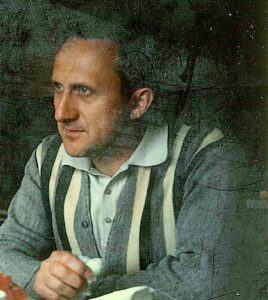
Toby Straton, 1967. Age 50
My dad urged me to get more involved in the family business, like point up some bricks, paint some walls, and get my hands dirty. He thought I should back off the typing and deal with real characters — plumbers, painters, bankers, insurance men.
I went into the real estate business, oh yeah. I stopped writing books and worked on a new long-term project — becoming worthy of the tombstone epitaph: “This guy didn’t screw up the family business.”
I found my dad’s correspondence with my agent a couple years ago. The letter was in the attic among some rejections. Here’s the letter . . .
“As Bert’s father, I’m sure you will understand my taking this opportunity, though I know Bert will shoot me the first chance he gets, to add that coupled with his talent he is a very dedicated, hard-working and disciplined writer. His heart, soul and efforts are all wrapped up in his work. And he started another book before he went off to Mexico to travel. On Bert’s behalf, I want to thank you for your encouraging letter, your interest in his book and everything you will do to try to get it published. Please do not hesitate to write me if I can be of further help during Bert’s absence. Thanks you so much and good luck.”
Is that an acceptance letter?
[This essay appeared, in slightly different form, in Belt Magazine in 2015. “My Acceptance Letter.”]
June 14, 2023 2 Comments
BUCKEYE BATTLE CRY
My father had one record album, an Ohio State marching band LP. No, that was my record. He bought it for me. My dad had no LPs. My dad had stock records. Toby bought his first stock, Seaboard Air Lines, when he was at Ohio State. Air lines meant train line back then. An air line was the shortest distance between two points – the way the crow flies.
My father didn’t mind I wound up at the U. of Michigan. He wasn’t a nutty Buckeye.
My band had a trumpet player who was a rabid Buckeyes fan. At one afternoon bar mitzvah party, I gave him time off during the gig to watch part of the OSU-Michigan game. The other musicians were nonplussed. They did not understand that the trumpeter had been in the OSU marching band and had attended every single Ohio State bowl game, including the Tostitos Bowl. My bandmates did not know my father had given me one album, The Ohio State University Marching Band featuring “Buckeye Battle Cry.”
My bandmates are still talking about the trumpeter’s “absence,” and it’s been years. Look, the football game was supposed to start at 3 p.m. but the TV honchos moved the start-time up to noon at the last minute. I doubt the trumpeter would have booked a gig if he had known it would conflict with the OSU-Michigan game.
One more thing . . . Simchat Torah (which just ended) sometimes gets hairy because of its occasional conflict with Indians/Guardians playoff games. I’ve got a nursing-home gig tonight and would have liked to play “Take Me Out to the Ballgame,” but I don’t see the point now with the Guardians out of it.
Go Bucks.
October 19, 2022 4 Comments
MY DAD WAS A NUMBERS GUY
This post is for everybody who read my Wall Street Journal article about my dad and wants more info on him. (The article, which was in Monday’s WSJ, is linked here.)
My father, Toby, got a letter from a Piney Woods Arkansas man, extolling my dad’s homemade foot powder: “Mr. Lesbert: Do NOT stop making the powdor! Do NOT stop!!” Toby used to make the foot powder in the basement. The company was Lesbert Drug Co., named after my sister, Leslie, and me. My dad stopped making the powder. The Arkansas man was about his only customer.
Then Toby started selling cosmetics. Then he starting buying buildings . . . on and on. He was the Jewish Willy Loman. (Kind of like how Dave Tarras — the klezmer clarinetist — was the Jewish Benny Goodman.)
My dad schlepped me to banks. I remember a banker who called my dad “Teddy.” That was weird. My father’s given name was Theodore and his Jewish nickname was Toby. This banker liked to talk Tribe (baseball) and his wife’s spaghetti recipes. The banker was a “people’s person,” he said. (Maybe he was a dogs’ person too.)
My father was not a people’s person. He was the Lone Ranger. He got the mortgage and we got out of there.
My dad owned one LP record, of the Ohio State marching band. My dad owned stock records. Toby bought his first stock, Seaboard Air Line, when he was at Ohio State. Air line meant train line back then. Air line was the shortest distance between two points — the way the crow flies. My dad never made money on stocks. He was too busy buying and selling and not holding. Toby was a stockbroker — a “customer’s man” — for about six months in 1955 at Bache & Co.
He liked numbers. He was totally a numbers guy.
Confidential report (1958): “On the basis of an analysis of the personal history and psychological test results, we believe that Mr. Stratton has the experience and ability to successfully handle his present position [at Curtis Industries, a car-key manufacturer]. He has shown personality characteristics, however, which may cause him to be difficult to get along with and, therefore, a supervisory problem.”
September 20, 2021 4 Comments
SHOES — MY DAD’S
My father, Toby, had about 15 pairs of shoes when he died. I didn’t take any of his shoes, even though he and I wore the same size. He had a foot fungus, and my mother told me to pass.
My dad had wingtips, golf shoes and tennis shoes. I never saw him in sandals, work boots or hiking boots. White shoes, definitely.
I’m more sensible about shoes — a habit I picked up from my mom. I like SAS shoes, which my mother told me about. She needed solid shoes when she got Parkinson’s disease. “SAS” stands for San Antonio Shoes. But I’m too lazy to go to the specialty shoestore to replenish. So lately I’m rocking Rockports.
When my then-20-year-old daughter studied abroad in Barcelona, she said I couldn’t visit her if I wore tennis shoes or a fanny pack. My SAS shoes were an excellent substitute for tennis shoes in Europe. I never did figure out a good way around the “no fanny pack” rule.
My dad wore Purcells abroad. He didn’t let his children tell him what to wear.
August 4, 2021 4 Comments
FAST FOOD WITH DAD
My father, Toby, ate his last meal out at Wendy’s on his way to Columbus, Ohio, for experimental leukemia treatments. He checked in to the hospital, then checked out, so to speak.
My father liked Wendy’s (headquartered in Columbus) because he had a quasi-business relationship with the company. Toby had almost invested in Wendy’s before it went national. Almost. Toby’s near-miss with Wendy’s stock topped my uncles’ near-miss sagas at Seder.
Toby liked fast food. He and I often ate at McDonald’s on the West Side. I got the Filet-O-Fish. I thought it was good for me. Toby explained franchising: the franchisor took a percentage of the action for eternity. Toby had been a franchisee/sucker with a cosmetics company — and he knew something about the food business, too. He especially knew about chazerai (junk food). Toby had worked in his mother’s candy store. When I visited my father’s grave the first couple times, I brought along Mr. Goodbars. Once, a Planters Peanut.
Decades later, I sat at the West Side McDonald’s with my oldest son, Ted, then 28. I ordered the chicken Caesar salad. I was instructing my son on the watchword of our people: Don’t be a sucker. Lesson 1: The first generation (Grandpa) scrapes, the second (me) tries to keep things on keel, and the third (Ted) needs tutorials in toughness because they don’t remember the beginning.
During Toby’s final days, the Cleveland Clinic nurses called him “chief” because he was bossy. A doc said, “You’re a hard one.” Toby answered, “That’s right. It’s my life.”
I told my son not to forget the little things: (Lesson 2) pens, checks, Post-It notes. Lesson 3: “Write everything down. You don’t want to think about ‘cold water leak, bathroom sink, apartment 24,” I said. Lesson 4: Be wary of restaurant workers, particularly chefs and servers. They come home late, party hard, and wake up the solid-citizens in the building. Lesson 5: Always Be Closing. ABC. That’s from a David Mamet play and is a joke between my son and me. Ted, like every other young person, enjoys quoting movies verbatim. I thought of a non-movie line for him. I said, “If the tenant hasn’t mailed his rent, say, ‘Do not mail in your late rent. Hand it to the building manager. Hand it.'” Ted seemed more interested in his burger. I wasn’t up to Mamet’s standards. “The job sucks on some level!” I said. That got my son’s attention. “You make it interesting. It can take a while.”
September 23, 2020 4 Comments
BIG NAMES
Howard Metzenbaum was a big name in my father’s generation. Metzenbaum made millions in parking lots, and eventually became a U.S. senator. My father and Metzenbaum were born the same year, 1917, in Cleveland. My dad didn’t know Metzenbaum but enjoyed following his career.
Metzenbaum, in his later years, owned a condo at Three Village, the holy of holies for upscale living on East Side Cleveland. The building went up in 1978 near Cedar Road at I-271. The Three Village condo development was wooded and secluded. My parents lived nearby, at the Mark IV apartments (now called the Hamptons). My parents liked brand-new housing; they weren’t keen on used. Everything had to be shiny and new, maybe because they grew up in poverty.
Across from the Mark IV was Acacia on the Green — a step up, rent- and prestige-wise, from the Mark IV. Next to Acacia was Sherri Park, a step down. Across from Sherri Park was Point East, a step up from Acacia but down from Three Village. These buildings all went up in the 1970s and were popular with my parents’ generation.
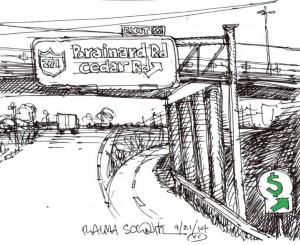
My parents never went inside Metzenbaum’s building. I did. I visited a rich friend who bought a condo in Three Village. Metzenbaum was long gone — dead as of 2008. The building’s buzzer directory read Maltz, Mandel, Ratner, Risman, Weinberger and Wuliger.
Maybe you have to be an old Cleveland Jew to appreciate that. If you’re not an old Cleveland Jew and have read this far, please explain why.
March 6, 2019 11 Comments
THE TAXMAN COMETH
Every January I spend a day filling out employer tax forms. My favorite is the Federal Unemployment Tax Act (FUTA) form. I did my first FUTA Form 940 in 1978, when my dad started going to Florida for the winter. He and his high school buddies golfed in Boca Raton, and I filled out FUTAs in Cleveland.
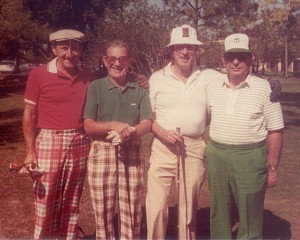
Toby Stratton (far L) w/ friends at Boca Lago CC, 1983
The treasurer of Ohio likes his W-2 reconciliations promptly. The state unemployment bureau also likes its money quickly. And don’t forget workers comp.
I used an IBM Selectric-style typewriter for tax forms until the machine died around 2011. The A key wouldn’t work. That was its main drawback. “ lbert Str tton” didn’t cut it with the government. I threw out the typewriter and several boxes of Ko-Rec-Type. I spent a few hours behind this typer:
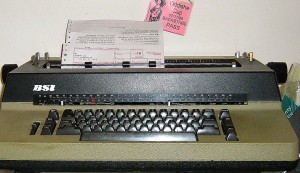
It’s an IBM knock-off, actually.
Now I use IRS computer forms, except for my Yiddishe Cup 1099s, which I do by hand. I used black ink on Yiddishe Cup’s 1099s. One year I used blue, which is ill-advised. The gobierno prefers black ink. I got with the program.
What are you in jail for?
Blue ink.
No thanks.
January 2, 2019 1 Comment
MY DAD HAD
A GOOD SHORT GAME
“Anything within 10 feet of the cup, Toby sank,” said Hy Birnbaum, a friend of my late father. I ran into Hy at the drugstore, where he worked part-time as a pharmacist. He was about 85 at the time. Hy said all his friends were dead. (My dad, Toby, had been dead about 25 years.)
I ran into John Kelly, who worked with my dad 30-plus years ago at the key company. John said one of the “big bosses” had slept in the key company office overnight because he had marital problems. This particular “big boss,” Sid, had a slew of problems. His kids were “real hippies,” said John. Sid was a loud-mouth, know-it-all, country-club Jew from Shaker Heights, I remember my dad saying. My dad kvetched about Sid frequently at dinner.
My dad disliked most “big bosses.” But the one “big boss” my dad liked, luckily, was the key company president, Manny Schor, who was a World Federalist, intelligent and not a show off.
 Manny came to my gigs occasionally in his later years. (Most of the big bosses at the key company were Jewish. The company was owned by a Jew.) Manny said, “I can still picture your father sitting at his desk.”
Manny came to my gigs occasionally in his later years. (Most of the big bosses at the key company were Jewish. The company was owned by a Jew.) Manny said, “I can still picture your father sitting at his desk.”
So could I.
Why were these old guys still alive and my dad dead? That’s what I wanted to know. My dad’s long game wasn’t so great.
—-
Toby Stratton 1917-1986, died just shy of 69; Manny Schor 1918-2009, 91; Sid 1921-2000, 79; Hy Birnbaum 1925-2016, 91; John Kelly 1931-2011, 80.
September 12, 2018 3 Comments
OVATION OF CALIFORNIA
My dad had a cosmetics franchise similar to Mary Kay. It was Ovation of California. My mother went to Los Angeles to learn more about it, and when she returned, she dumped a box of cosmetics onto the dining room table. My sister got the cosmetics, and I got a shoehorn from the Beverly Hills Hilton Hotel.
My sister held up her diary. “Look what your darling son did to my diary while you were gone,” she said. I had cut the lock off her diary. Big deal.
“I apologized,” I said. (I was researching petting — as Ann Landers called making out. I was 13, my sister was 16. I thought she had some info.)
My mother said, “So you tore open your sister’s diary?”
“I’m sorry.” I bought my sister a new diary.
One more crime: my father put a bottle of Ovation cleansing cream in the bathroom and made me use it. I was supposed to rub the cleanser on my forehead with a cotton ball. “This is no gimmick,” he said. “Men use it.” My dad tried to turn me into a metrosexual! The franchise went under in a year.
—
Yiddishe Cup plays 6:30 pm Sun. (July 12) in Granville, Ohio (near Columbus). More info here.
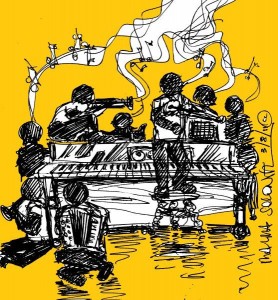
July 8, 2015 7 Comments
LISTEN UP
My father wore a hearing aid from age 50-on. He went to a hearing expert, William Lippy in Warren, Ohio, for stapedectomy surgery, but the surgery didn’t help.
My dad missed nuances because of his poor hearing. For instance, I would say, “Haney [a custodian] is burning some shit in the incinerator. The firemen told him not to.”
My dad would answer, “A lady is learning what?”
I repeated it slower. My dad would say, “Now you’re starting to tell me something!”
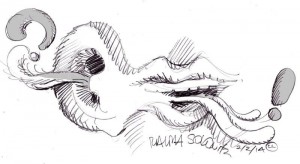 My father liked to give advice, maybe because he didn’t hear advice. He spoke very deliberately. He was like Sevareid. My dad’s main advice was “Look out for yourself, no one else will.” Bill, a tenant, ran a beauty parlor; my dad said to him, “I’m only looking out for myself, Bill. You’re just giving me a two-percent CPI increase.” (Bill was trying to low-ball a renewal figure on his beauty parlor lease.)
My father liked to give advice, maybe because he didn’t hear advice. He spoke very deliberately. He was like Sevareid. My dad’s main advice was “Look out for yourself, no one else will.” Bill, a tenant, ran a beauty parlor; my dad said to him, “I’m only looking out for myself, Bill. You’re just giving me a two-percent CPI increase.” (Bill was trying to low-ball a renewal figure on his beauty parlor lease.)
Bill said, “You don’t have to tell me about looking out for myself. I own a rental condo.” Store tenants frequently owned residential rental property on the side, like double houses or condos by the lake.
“There is nothing short of outright speculation that will equal real estate,” my dad said. “There are unmerciful and countless forces arrayed against us.”
Listen up.
—-
The quote “There is nothing short of outright speculation that will equal real estate . . .” is out of context here; my dad didn’t say it to Bill. My dad wrote it in an unpublished manuscript. More on that some other time.
—
I wrote a good article about my father for the latest Belt Mag.
—
Come to Cain Park (Cleveland Heights) Sunday (June 28) at 7 p.m. for a free klezmer concert. Evans Amphitheater. No tix necessary. Yiddishe Cup plays the second half of the show. The first half is Steven Greenman and Lori Cahan-Simon. The 37th Annual Workmen’s Circle Yiddish Concert.
June 24, 2015 1 Comment
OHIO STATE VS. MICHIGAN
I was at a brunch where all the men wore Ohio State apparel. That in itself was not unusual; I know a lot of Ohio State fans who do brunch, but the host at this brunch was particularly Bucks-nuts; he would not let anybody into his house with Michigan gear on.
I’m not that big a football fan. I’m a Michigan graduate but I wish Ohio State all the best — most of the time. I like it when Michigan is winning, but this year the team is horrible, so let Ohio State go all the way.
Yiddishe Cup had a trumpet player — a sub — who played in the Ohio State marching band. He played a luncheon with Yiddishe Cup, and the OSU-Michigan game (originally scheduled for 3 pm) went on at noon, so I gave the musician leeway on the bandstand; I let him periodically watch the Bucks on a TV in a corner. The other guys in the band thought I was too accommodating. They didn’t
understand . . .
Take 1962: OSU versus Northwestern, homecoming. Before the game, my dad and I went to a reunion luncheon. My dad had on a Class of ’38 name tag. I don’t know what the name tag read; my father changed his name from Soltzberg to Stratton in 1941. The theme for the fraternity floats in 1962 may have been “Peanuts.” My dad knew the words to “Carmen Ohio,” the OSU alma mater. My dad never knew the words to any song!
My dad and I went to about a half dozen Ohio State homecomings. I liked Long’s Bookstore for sweatshirts. Charbert’s for hamburgers. We checked out the floats on fraternity row. My dad wanted to show me the medical school.
The Bucks: Tom Matte, Warfield, Matt Snell and Bob Ferguson.
If Michigan doesn’t win it all (and it ain’t going to this year), let Ohio State.
November 26, 2014 2 Comments
ADDRESS YOUR MESS
My mother, Julia, never saved anything. When she moved to assisted living, the only thing she kept was her dining room set and some clay pots my dad had made.
My dad was an amateur potter in his retirement. He didn’t use a wheel; he pinched the clay with his thumbs. His work wasn’t too good; I threw most of his stuff in the garbage. My mother watched and said, “How could you!”
“Mom,” I said, “I’m saving some of it– some representative pieces!”
Address Your Mess.
Address Your Mess is a woman in Cleveland who, for a fee, de-clutters your house. My mother didn’t need her.
Maybe I need AYM. I have report cards from elementary school in my attic. My mother said I could be president someday, so I’m holding on to the report cards.
Is my mess more important than your mess?
I gave the Address Your Mess phone number to a high school friend whose parents moved out of their bungalow after 50-plus years. They had stuff.
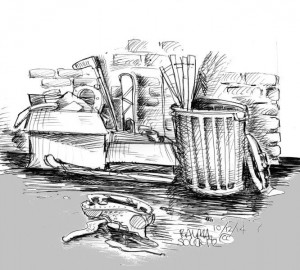
I read about an elderly woman in southeast Ohio who had 36 boxes of cereal, GAR medals and a wooden fife from the battle of Chickamauga.
I have UN stamps too, besides the report cards.
—
Here’s a vid, “Square Mile,” about real estate and board games:
https://www.youtube.com/watch?v=qYnabJr7esc
—
Yiddishe Cup is at Fairmount Temple, Beachwood, Ohio, tonight (Wed.) and Park Synagogue, Cleveland Hts., tomorrow night.
October 15, 2014 6 Comments
AMERICAN GREETINGS
“Cleveland is a hard town. I came near committing suicide when I lived there.” — Robert Crumb, American Splendor intro, 1986.
Crumb worked for American Greetings. My dad, Toby, worked there too.
Toby was at American Greetings before Crumb. My dad worked with Morry Stone, who eventually became a vice chairman. My dad didn’t like working for anybody, including Morry, so Toby left in 1954.
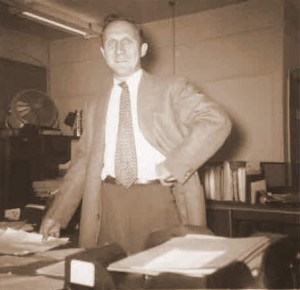
Toby Stratton, 37, at American Greetings, 1954
Everybody in Cleveland has worked at American Greetings, I think. Or tried to. I applied for a job at American Greetings in 1981.
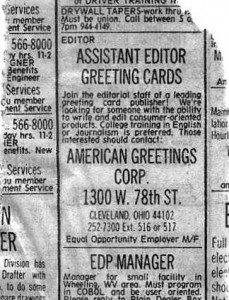
Plain Dealer, 1981
American Greetings had a Creative Building at West 78th Street. I didn’t even get called in for an interview. Maybe I wasn’t sick enough to write sick cards.
***
Robert Crumb again, 1996, Bob & Harv‘s Comics: “Cleveland is a city that has been ravaged by financiers and industrialists . . . its population abandoned to their fate, left to freeze their ass off, standing in the dirty winter slush, waiting for a bus that is a long time coming. Somehow they go on living.”
I haven’t lived anywhere else, so I can’t complain like Crumb. I went to college in Ann Arbor (which doesn’t count) and spent a few months in Bogota, Colombia, in my twenties.
Bogota was tougher than Cleveland. That, I can testify to. Bogota was rainy, gray, and headache-inducing from the high altitude. Cleveland was simply rainy, gray and slushy.
***
A pilot stood in a grassy field by the Bogota airport and said, “Tell your friends to throw their packs in back and we’ll be off.”
They weren’t my friends. They weren’t even Americans.
We climbed into the cargo section of the plane. “It smells like shit in here,” a Swiss girl said.
“This is Fish Airlines,” the pilot said. (Aeropesca.)
We landed in the Amazon a few hours later.
I ran into a college friend in the Amazon! I knew him from my freshman dorm. He said, “I scamp.” That meant he sold gems, coke, pot or counterfeit bills. “I’m going to reunite with my creators soon,” he said.
What?
“I’m going back to my parents.”
Adiós, amigo.
I tried to catch the ferry to Belem, Brazil. I waited several days in Leticia, Colombia, by the Amazon River dock, but the ferry didn’t arrive. I flew back to Bogota on the guppy/yuppie flight. (Guppies to Bogota, yuppies to the Amazon.)
In Bogota, I froze — even indoors. I wore two sweaters and socks-for-gloves in a small house I shared with a widow and her maid. I taught English at a nearby private junior high. For fun at night I read Cancer Ward . I also looked at photos of beauty queens from El Espacio and El Bogotano — the tabloids. My bedroom had doggy pictures on the wall, a toy cannon on the windowsill, and a crucifix over the bed.
For mental exercise I tried to reconstruct my high school schedule: first and second periods, PSSC Physics. What was third? What was PSSC? [Physical Science Study Committee.] I didn’t know many people in Bogie.
I heard Charlie Byrd play “Bogota” in Bogota. He was on a government-sponsored tour. Byrd en guitarra, con bajo y batería. (Byrd on guitar, with bass and drums.)
I went back to Cleveland after three months.
American Greetings. I couldn’t take Bogie. The major bookstore in Bogota was run by a Nazi, I thought. The owner was German, and I fabricated a fake bio, in my head, about him. I went to the Peace Corps office to borrow more paperbacks. I got Papillon, about a prisoner in Latin America.
I played blues harp for my English class. The kids loved it but the administration didn’t.
I had to leave. Bogie was un frío horrible (a freezing cold).
Crumb should write about Bogota. I want to hear his take on a real tough town.
—
Footnotes:
1. My Bogota adventure was in 1974.
2. I didn’t meet my college friend in the Amazon. I met him in Bogota. I remembered the encounter incorrectly. My friend straightened me out in Cleveland in 2013.
February 12, 2014 5 Comments
TEMPLE IN THE ROUND

The former Brith Emeth temple in Pepper Pike, Ohio, looks like a clam shell or flying saucer.
My kids went to Hebrew school there. It was disorienting; I never knew which way to turn, right or left, to pick them up.
The acoustics in the social hall were bad. Everything was boomy.
Brith Emeth folded in 1986, and Park Synagogue East took over. Then Park Synagogue East sold the building to the Ratner School, a Montessori school. Now Kol HaLev — a Reconstructionist shul — rents from the Ratner School, the owner, for shabbes services.
When my band plays Kol HaLev, I tell my musicians, “We’re playing the clam shell.” I never say, “We’re playing Ratner Montessori School.” I also don’t say, “We’re playing the old Park East,” which would be confusing because there is a new Park East. I also don’t say, “27575 Shaker Boulevard,” because for a while, shrubs in front of the building obscured the address.
“We’re playing the clam shell, aka the flying saucer, guys.”
On October 17, 1969, Rabbi Philip Horowitz delivered the sermon “Is the Negro Equal?” at the clam shell.
The place still has a very sixties flare. I travel back in time every time I enter Brith Emeth. After-burners. The clam shell. The launch pad.
—
More on Brith Emeth here.
—
Yiddishe cup plays First Night Akron (Ohio), 6-8 p.m. Tues., Dec. 31.
—
SIDE B
For the record . . .
JUST NUMBERS
If you get a 3 percent return, on top of the inflation rate, that’s solid, middle of the road. But right now you can only get 1 percent on a CD, with inflation around 1 percent. You can’t get 3 percent without significant risk. If you go for more than 3 percent real growth, you’re taking a risk.
Risk in business is integral, part of the equation. Can’t be avoided.
You’re a genius; the stock market is booming. You weren’t a genius in 2008.
I know a woman who lost with Madoff, and now she’s doing the 1 percent CDs. I talked to another Madoff investor who said she had found a short-term investment that paid 20 percent. But for only 90 days. Twenty percent is 20 percent, doesn’t matter how long a period. Twenty percent is crazy. “That’s a lot of risk!” I said.
I have a friend who went in for CDOs (Collaterized Debt Obligation) and lost. He said he was getting 15 percent on them. But it only lasted a month. Then the whole thing collapsed.
We are here today to commemorate the fifth anniversary of the Madoff debacle . . . Another Madoff investor I know — enough with the Madoff! — this Cleveland schoolteacher said she didn’t think she was greedy when she was pulling in 10-12 percent a year from Madoff. She just thought she had made a good investment. I would have thought likewise. Madoff returned the schoolteacher’s original investment minus the paper gains. A small-timer, she got national TV attention for being a salt-of-the-earth Madoff victim.
The stock market typically clocks 9 percent per year, but that’s meaningless because the figure doesn’t take into account human behavior, known in the biz as “investors returns.” Most people buy and sell at the wrong time.
My father went all in on real estate 1965, and that’s why I’m in real estate now. He went in at the right time, luckily, and leveraged himself to the hilt. Our house was leveraged; he had second mortgages. He was gutsy, smart and fortunate. (He flopped at some other businesses.)
I’ve bought two buildings. The first building, I put down 25 percent and got a 10 ¾-percent mortgage. That was the going rate in 1987.
The second building, I put down 15 percent. I bought it from an old guy who was dying. I was dying too! The old guy lived another 21 years. The seller financed the deal; I didn’t have to go to the bank for a mortgage. I paid him off 17 years later. It worked out.
The first building — the one with the 10 ¾-percent mortgage — I paid off as quickly as possible. Took 7 1/2 years.
Win more than lose, hopefully.
And don’t chase 20 percent returns!
Hey, did my kids read this far?
December 25, 2013 8 Comments
{TODAY I AM A MAN} X 2
My son Jack played his first professional gig with Yiddishe Cup at age 8, when I gave him five dollars to play “Wipe Out.” We were at a temple Chanukah party. Before that gig, he had done pro bono work, sitting in frequently with the band and stealing the show. The senior citizens loved him.

Jack, age 4, 1992, Beachwood library, tambourines and drumsticks.
Years later, Shirley Guralnik, a fan of the band, would ask me, “How’s the little one?” And I would answer, “The little one is in college now and bigger than me.” Shirley died in 2011. She had followed Jack’s career from the beginning.
Jack never got nervous. A case of nerves was hard to develop if, like Groucho Marx, your stage-mom (or dad, in this case) put you on stage practically in diapers.
I told Jack I would pay him $75 — real money — for a real gig after his bar mitzvah. He would be Yiddishe Cup’s drummer for some gigs. He wouldn’t just sit in.
He did great.
Jack got uptight only once. It was at his own bar mitzvah — not the music, reading Torah. The rabbi asked him, “How nervous are you on a scale of 1 to 10.”
“Eight.”
“That’s not bad,” the rabbi said.
Jack said, “I’ve never been an 8 before!”
***
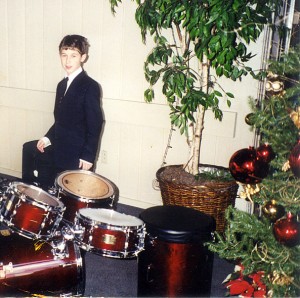
Jack, 13, 2000, at his first "real money" gig
Jack’s $75 gig was at the Barrington Golf Club in Aurora, Ohio. A country club staffer asked if she should light the Christmas tree for the bar mitzvah luncheon. I said, “Not a good idea.”
On the way home, we stopped by my dad’s grave on Aurora Road. I told Jack to place an old clarinet reed on the grave marker.
My point? 1) I didn’t have any old drumsticks. 2) I was at my father’s grave with my youngest kid, who I had just paid to work, just like my father had paid me (to paint walls, argh). The cracked reed fit into the Jewish star on the grave marker.
My son got the $75.
Jack’s band, Vulfpeck, 2013. Jack on keys.
(Today I am a man) X 2 = Age 26, 2013
October 9, 2013 2 Comments
MY DAD HAD A
GOOD SHORT GAME
“Anything within 10 feet of the cup, Toby sank,” said Hy Birnbaum, a friend of my late father.
I saw Hy at the drugstore, where he worked part-time as a pharmacist. He was about 85 at the time. Hy said all his friends were dead. (My dad, Toby, had been dead about 25 years.)
I ran into John Kelly, who worked with my dad 30-some years ago at the key company. John said one of the “big bosses’” had slept overnight in the key-company office because he had marital problems. This big boss, Sid, had a slew of problems. His kids were “real hippies,” said John. Sid was a loud-mouth, know-it-all, country-club Jew from Shaker Heights, I remember my dad saying. Toby liked to kvetch about Sid almost nightly at dinnertime.
My dad disliked most “big bosses.” Who didn’t. One “big boss” my dad tolerated, luckily, was the key company president, Manny Schor, who was a World Federalist, very intelligent and not a show off.
 Manny came to my gigs occasionally in later years. (Most of the big bosses at the key company were Jewish. The company was owned by a Jew.) Manny said, “I can still picture your father sitting at his desk.”
Manny came to my gigs occasionally in later years. (Most of the big bosses at the key company were Jewish. The company was owned by a Jew.) Manny said, “I can still picture your father sitting at his desk.”
So could I.
Why were these old guys still alive and my dad dead? That’s what I wanted to know. My dad’s long game wasn’t so great.
—-
Where are they now:
Toby Stratton 1917 – 1986
Sid 1921 – 2000
Manny Schor 1918 – 2009
John Kelly 1931 – 2011
Hy Birnbaum 1925 –
October 2, 2013 6 Comments
PAPES
I feel bad for the Cleveland Plain Dealer. The PD is understaffed and demoralized. But I feel worse for myself. I want my local news, in print, on the breakfast table every morning. (The paper is now home-delivered only four days a week.)
Yes, I’ve heard of the Internet and iPads. I’m not going that way with my papes!
When John Gilligan, an ex-Ohio governor, died, I read about it two days late. That’s not right; I should have gotten that news sooner.
I’m signing up for Pony Express.
The Wall Street Journal stopped coming to my house the same day the Plain Dealer died (August 5). All newspaper home-delivery got screwed up. A neighbor — nine houses away — still received the Wall Street Journal. I took hers. She didn’t need it! (She has a different delivery guy, apparently.)
My cousin George, a big sports fan, is in a newspaper funk too, because he can’t read the Plain Dealer sports pages daily with his morning coffee.
Everybody over 50, please repeat with me: “Screw Newhouse!” (Newhouse owns the PD.)
My son Ted delivered the Sun Press, a weekly. I was his sub. My dad delivered the Cleveland News. My grandfather delivered the Vilna Bugle (Shofar), maybe. My dad wouldn’t allow me to be a paperboy. He wanted me to enjoy life more than he did.
I enjoy papes. Where are my papes?
—
SIDE B
This is a fake profile. The complete fake-profiles series is here.
WHATEVER IT TAKES
I’ve played Perchik and Tevye in Fiddler on the Roof.
Sometimes I get calls from small-town theater troupes to discuss Jewish stuff, like Fiddler. They ask about yarmulkes and the breaking of the glass, and chair lifting.
I make up stuff. I’ve been to enough Jewish weddings to know the rabbis make up stuff too — particularly about the glass breaking. There are many reasons why the glass is broken. All bobe mayses (old wives’ tales).
When I’m not acting, I do a one-man variety show. I play a little guitar, hand drum, even harmonica, and I sing. I know some Yiddish. I use backing tracks.
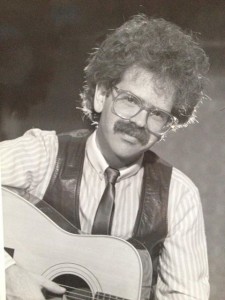 Here’s a promo pic from my glory days. I use it sparingly, now that I’m 59 . . . . . . . . . . . . .
Here’s a promo pic from my glory days. I use it sparingly, now that I’m 59 . . . . . . . . . . . . .
I should advertise in the back of Hadassah mag like Ruth Kaye and Caryn Bark. Who are they?
Who am I? I hear you. I live in Jersey and play the nursing home circuit in the tri-state region. And I work Florida in the winters.
I’ve played Tevye three times. I’ve also played the lead in Jesus Christ Superstar at summer stock in Ohio.
Whatever it takes.
L’shanah tova. (Happy New Year.)
September 4, 2013 2 Comments
NEVER ON FRIDAY AFTERNOON
I had two hot water tanks go out in the same building on the same day, a Friday afternoon.
Four guys can carry in a 92-gallon commercial hot water tank . And I can pay $5,400 for their fun.
No plumbers were around. They were all preparing their boats for Lake Erie weekend-cruising.
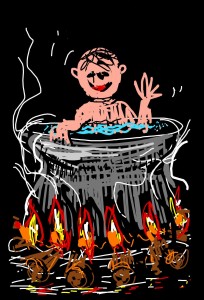 I reached Stack Heating. Stack said he didn’t do commercial hot-water tanks. Just boilers. I reached Royal Flush. They said they couldn’t get it until Tuesday. Dale at Madison Plumbing could do it Monday. Pompeii said never. B & B Hot Water Tank said no thanks.
I reached Stack Heating. Stack said he didn’t do commercial hot-water tanks. Just boilers. I reached Royal Flush. They said they couldn’t get it until Tuesday. Dale at Madison Plumbing could do it Monday. Pompeii said never. B & B Hot Water Tank said no thanks.
I started flipping through the Yellow Pages. That is the end of the world.
I braced myself for calls, like “Mr. Landlord, there is no hot water. How am I supposed to go to work without showering? ” . . . “I have to stay at my parents’ house and it’s 60 miles from work . . . ”
It’s not pleasant, these scenes.
I got Bill the plumber. He came by and blow-torched the old tanks to dry them. (The tanks had flooded because a sump pump had failed.) The plumber gave the first tank a 50-50 chance of recovery. The second tank had 40 percent chance, he said. I liked his odds.
The first tank went on after six hours of pampering. We were good.
Still, it was no picnic.
. . . Dear Landlord, I have deducted $275 from my rent payment because I stayed in a hotel for three days due to the lack of hot water.
Didn’t happen!
—
SIDE B
In honor of the mildest summer ever . . .
WICKIN’ COOL
I threw out my dad’s wife-beater T-shirts. About time. My father died 27 years ago. The wife-beaters were balled up in my dresser drawer.
When it’s 90-plus degrees — which it isn’t often this summer — I think “wife-beaters.” I used to wear my dad’s wife-beaters around the house.
My wife bought me a wicking T-shirt with UV protection at Target. Only $11. It was cooler than the wife-beater.
I saved one of my father’s T-shirts for posterity and threw the rest out.
Underwear fashion is generational. My grown sons aren’t interested in my wife-beaters. My dad wore his wife-beaters under dress shirts for work, for his day job at the key company.
I’m going to buy a couple more ultra-light wicking T-shirts.
No doubt, my sons will pitch my ultra-lights when I’m either dead or not looking. By 2025, T-shirts will be spray-on from a can.
Meanwhile, I’m wickin’ cool.
—
A version of “Wickin’ Cool” was on CoolCleveland.com 7/12/12.
August 28, 2013 2 Comments




